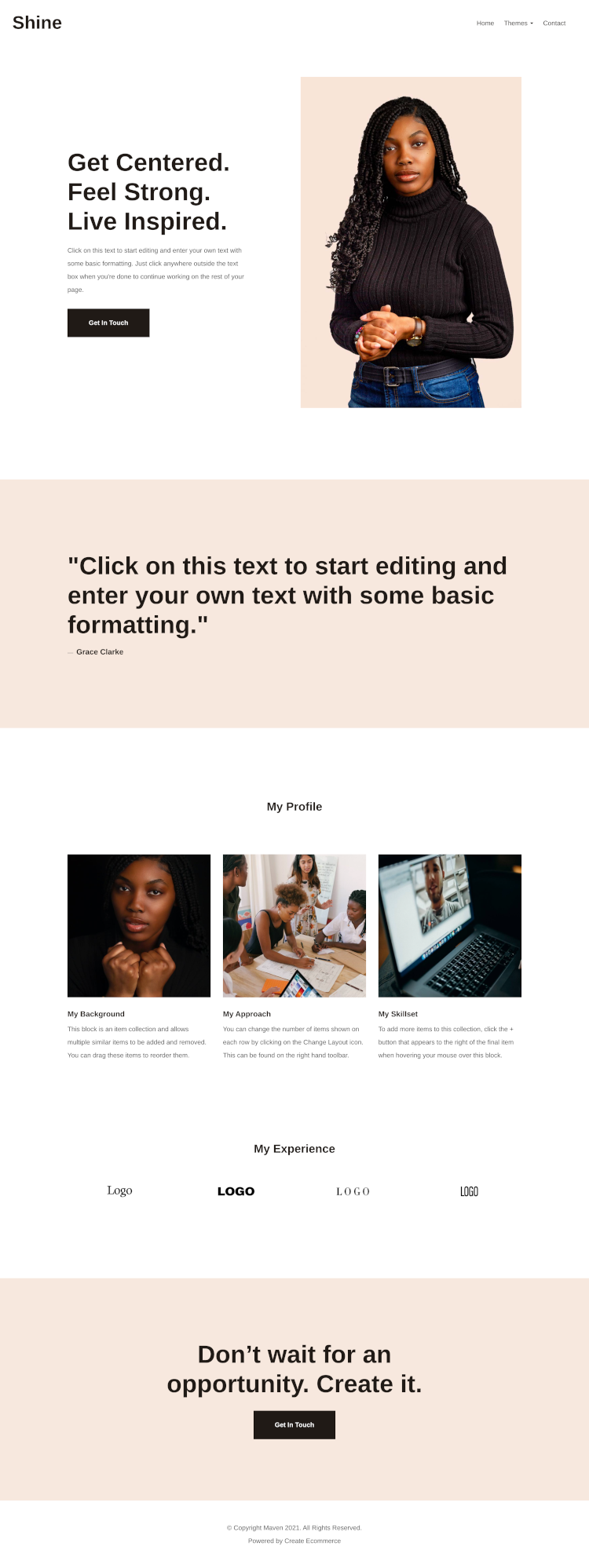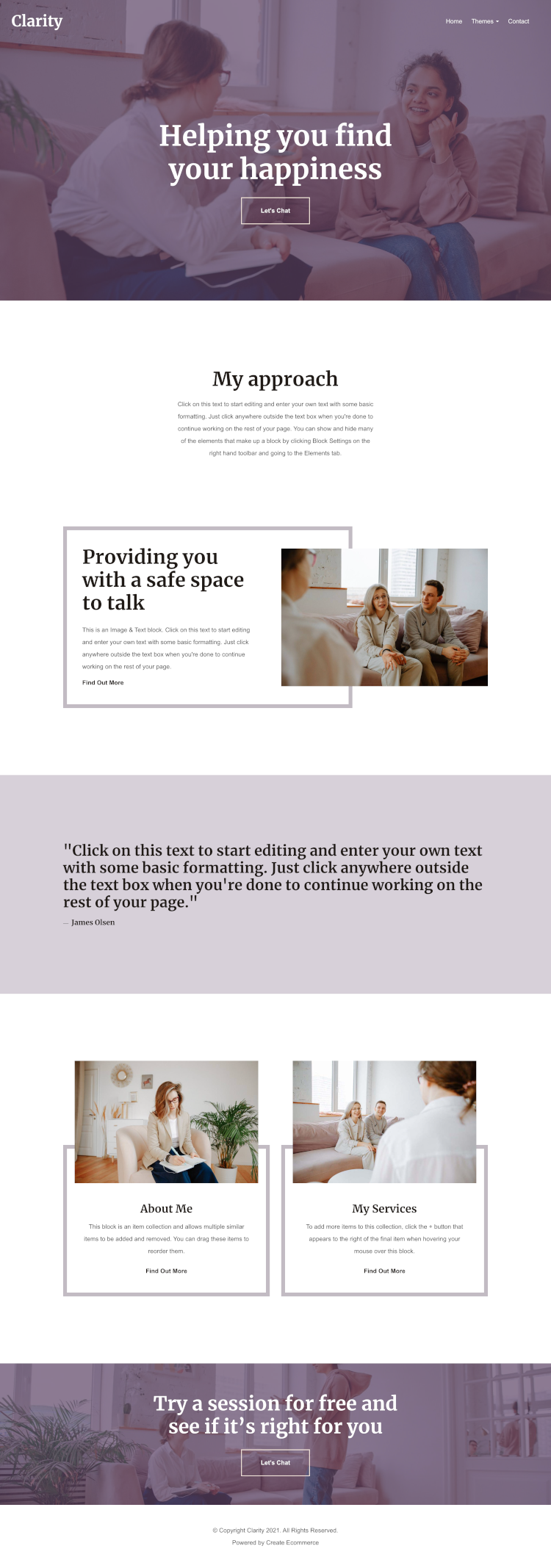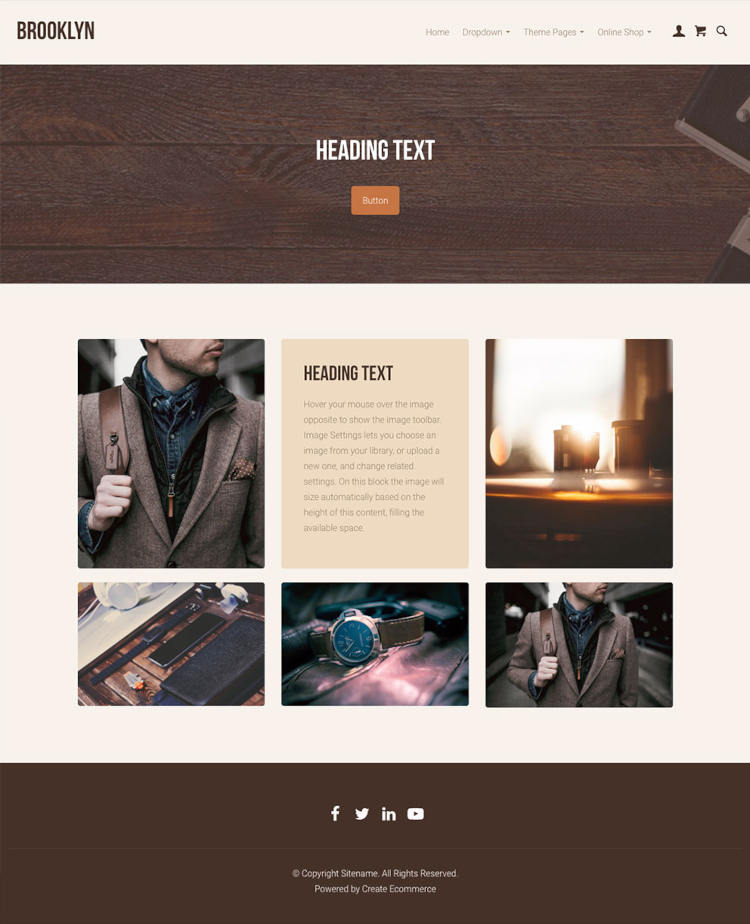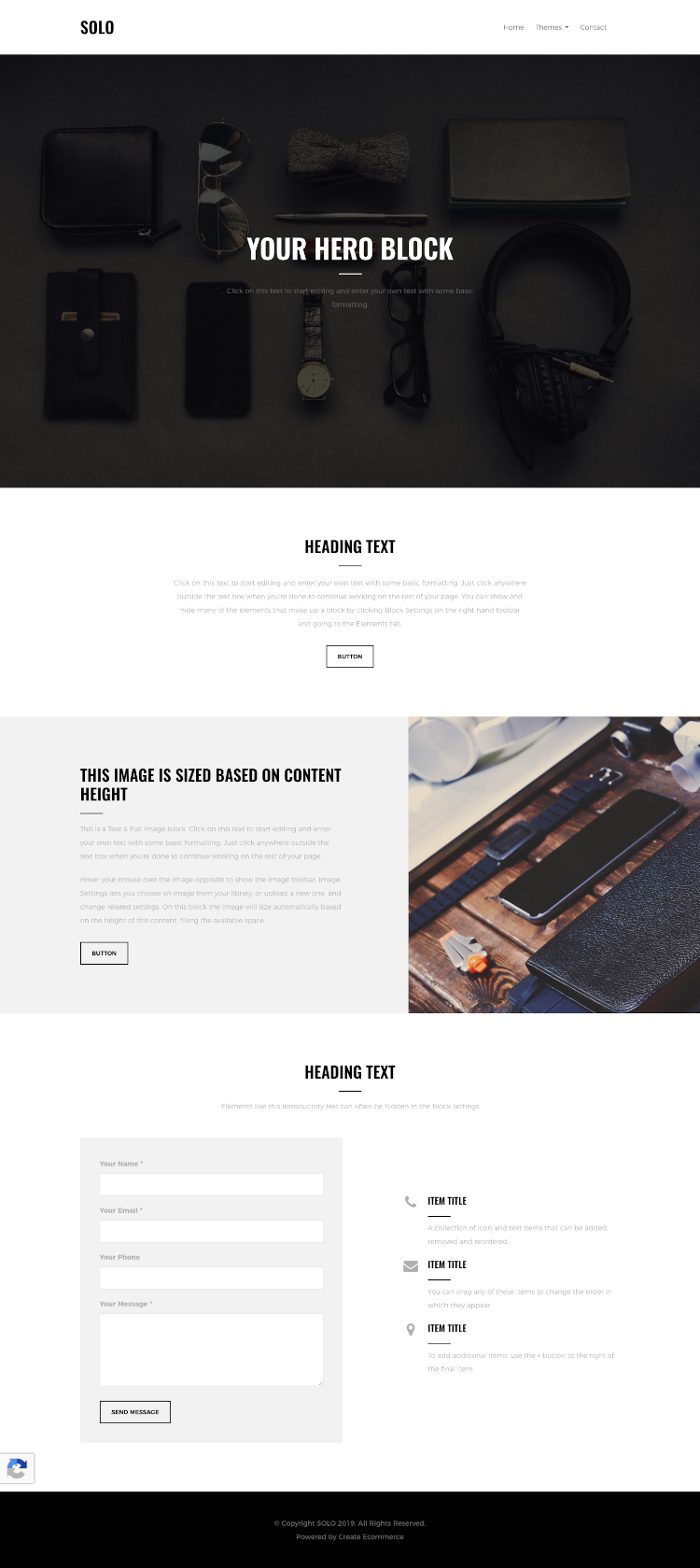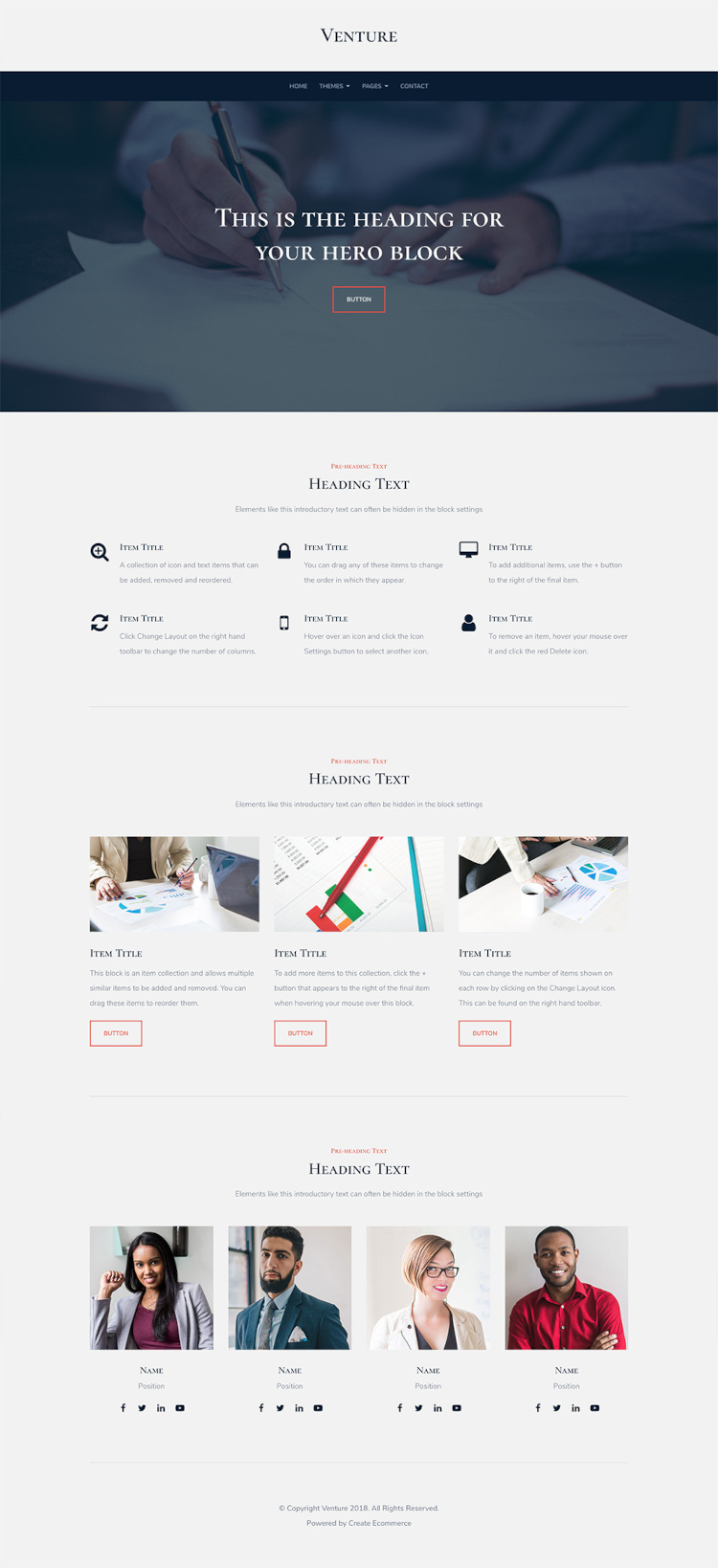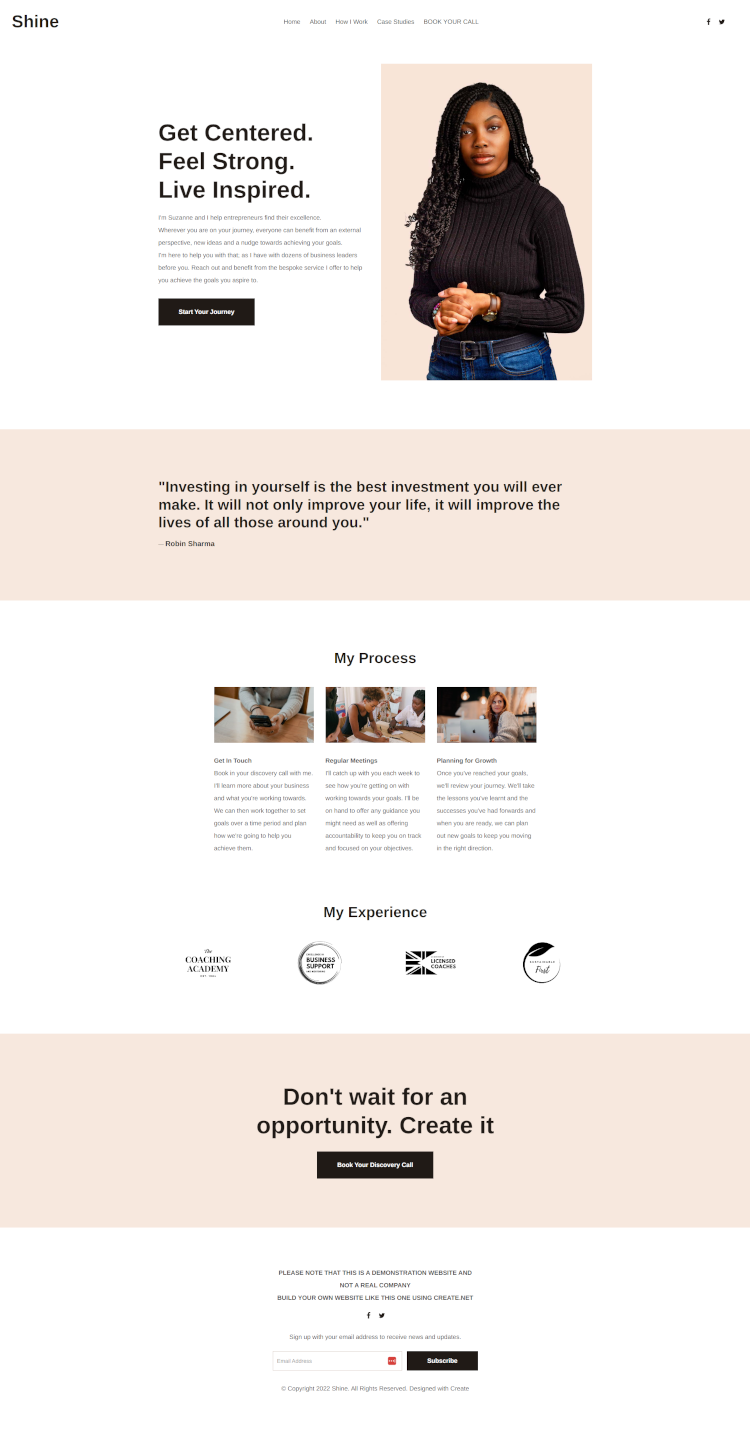Blog > How To Build A Successful Coaching Business Website
Posted By Create
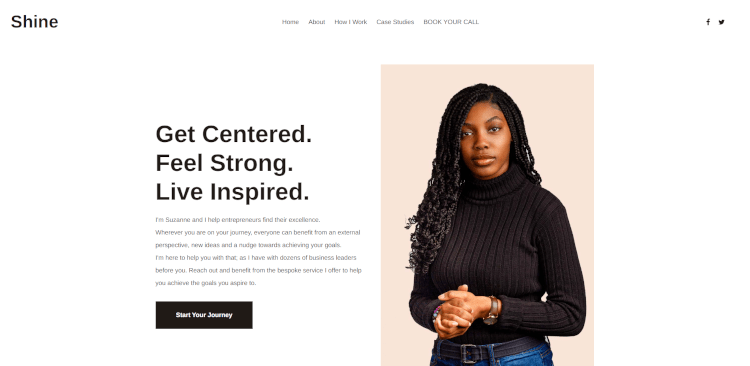
So you’re ready to take the next step with your coaching business and take it online by building your own website. Congratulations! We’re here to ensure you have everything you need to know before starting.
Building a website is straightforward when you have the right tools. Using a website builder like Create, you can simply create pages based on a template, and drag & drop what you’d like onto the page.
This blog explores how you can best represent your new business online. Instead of showing you how to build a website, it’ll offer you advice on what elements should be included on your pages, and how you can place them together to attract clients and entice them to make an enquiry or schedule a meeting with you.
Start Building Your Coaching Website With Create >>
Once you understand how to structure your pages for success, all that’s left is to fill them with beautiful images and content. On Create, we even have Coaching Website Templates to help give you the best head start possible. You can also find a winning, step-by-step structure for building your home page on our blog
Want Your Own Website?
Start Building Today!
No credit card needed. By submitting this form you agree to our T&Cs and Privacy Policy.
We’ve put together an example website, Shine, to demonstrate how you can approach structuring your website and to offer some inspiration. Here are some of the things you should look out for:
Keep an Objective Focus
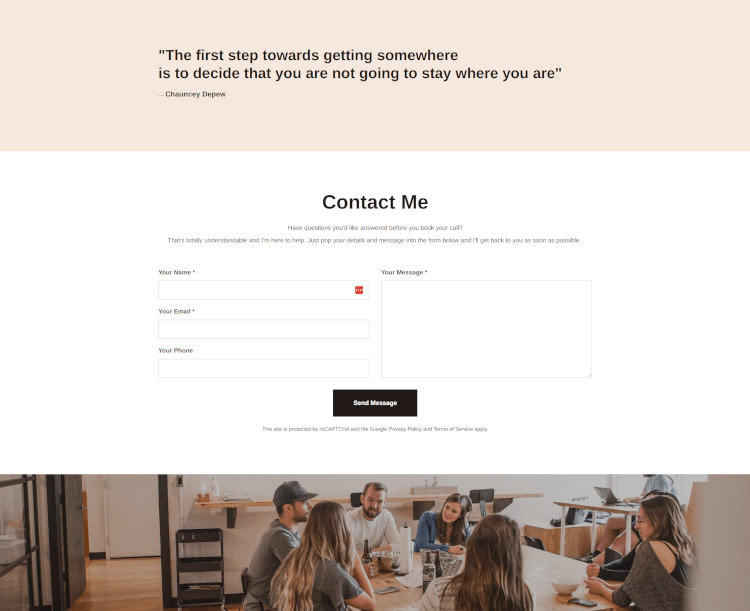
When you first build a website, you soon start to realise how much potential it has to help with a variety of goals.
You can encourage enquiries, get people to follow you on social media, promote an event you’re running, showcase other business owners you work with, promote complementary products and services, and more.
One of the easiest traps to fall into is trying to do too much with your website at once, rather than focusing on a singular website objective.
Of course, there is scope to do all of these things with your site but you have to make sure you can walk before you run. It’s important to make sure that your site can do one thing for your business really well first and then build on that success.
The most important objective of many coaching websites is that they keep a steady stream of enquiries and prospective clients coming through. Therefore, in the first instance, you should work to create a journey on your website focused purely on meeting this objective.
Consider how you will help prospective clients decide that they want to contact you. What information do they need before they do so? Write out what pages you think you’ll need and how you connect them into a journey your website visitors can follow.
A brilliant way to make sure you’re on the right track is to consider what’s in your header menu. Is each item in your menu critical to helping a client make an enquiry? Is everything they need to make a decision easy to find? The sections below offer more ideas of pages you should consider along this client journey.
Tell Your Story
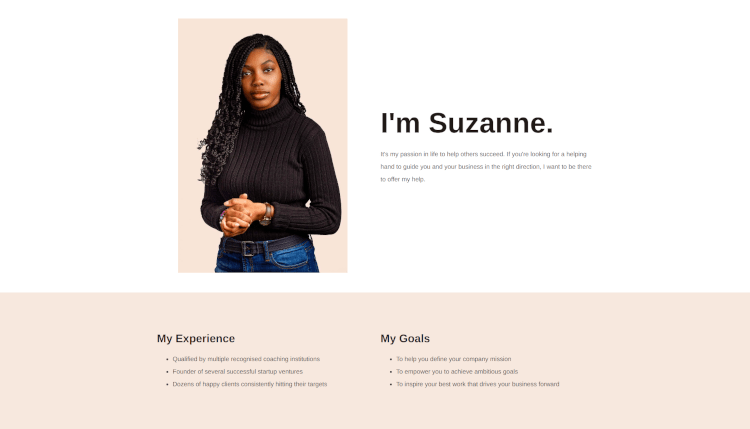
How did you get started? What drives your passion for helping others? What motivates you to deliver results for your clients? Sharing your background, ambitions and passion with your website visitors can help them start to know you, even before they reach out. They can start to understand what drives you, how you’re qualified, and why you’d be a good fit for them with your service.
This information is normally included on the About Page on your website where you can explore this in depth. The About page is perhaps one of the most crucial pages on any website for building trust with your visitors as this is where they relate to you as a person rather than as a business.
It’s especially important to talk about who you are and if you feel comfortable, to show your face there. If you haven’t met your potential clients in person already then this is an opportunity for your website visitor to see you for the first time.
Your client will be working with you closely and this not only builds trust, but shows that you’re a confident coach. It’s worth considering the imagery you use here too so you are reflective of the type of client you want to work with.
Find out how to build an effective About Page >>
Let People Know What to Expect
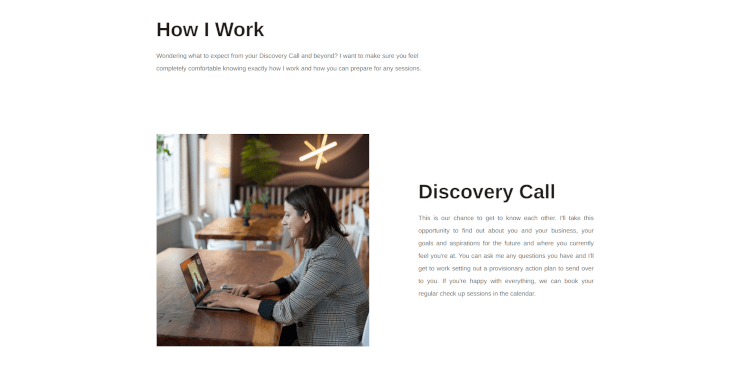
Fear of the unknown keeps us from moving forwards and taking action that we know we need to. The same could be said for your potential clients. The key to helping them take action and contact you is to help them to know what to expect at each stage of their journey.
Build on the content about who you are to give your prospective client a clear idea of what they can expect from you as their coach, how you work, and what their journey with you may look like.
In the case of Shine, we’ve outlined a Discovery Call to get to know the client, learn their objectives and discuss how we might be able to help them. This is then followed by a set amount of checkup / accountability sessions. To wrap up, there is a review session where we would go over the progress over the time spent working together and discuss what they might want to work on next.
The whole process is outlined and a client can feel assured that they are in control and know what will happen from the point they contact you. It can also be really beneficial to add in answers to questions you are often asked on this page in an FAQ section. If they have questions about what to expect, it’s likely they will have come to this page looking specifically for the answers.
Display Results with Case Studies & Testimonials
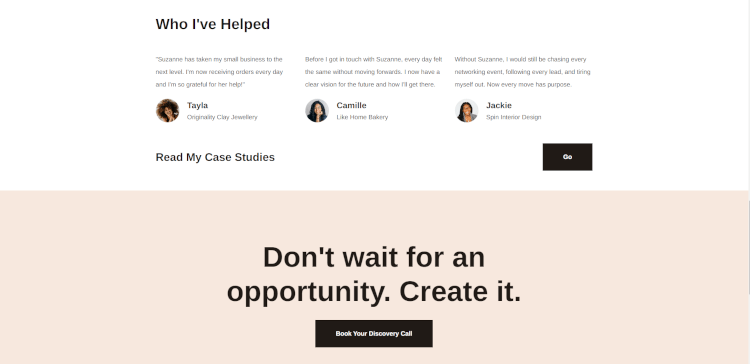
There’s nothing more powerful on a website than what previous clients have to say about their relationship with you - or further to that, exploring how you’ve helped your clients in detail through case studies.
People want to hear stories that they can relate to. They want to see how you’ve helped others so that they can pick out parts of their own story. This helps them to decide if you’d be able to help them in the same way as you have others.
If you already have some case studies you can share, this is a fantastic place to start with content on your website. Explain the process from start to finish with a focus on the results along the way.
If you’re able to get a testimonial from these clients to build into your case study, this is a brilliant way to validate what you’re saying to prospective clients and build trust.
If you don’t yet have any feedback to work with, you should check out our blog on obtaining quality testimonials for your website. You’ll discover some quick tips that you can implement into your client journey to build their feedback into part of your process. You can even use your website to acquire feedback for you.
Make Taking Action Easy
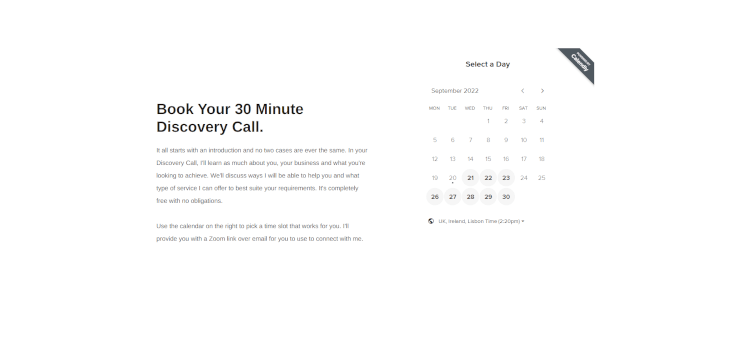
Shine’s Contact / Bookings Page >>
At every point of your client’s journey through your website you should strive to make taking the next step as easy as possible. Whether that’s using thoughtful calls-to-action (buttons) to lead them to the next most relevant resource, or building in functionality to improve their experience of your site.
The biggest challenge for coaches is to encourage their prospects to commit to reaching out and booking some sessions. A contact form is one way to do this, but it requires them to write a message to you and organise the sessions with you over email.
You could reduce the effort it takes to reach out initially by asking them to book at a time that’s convenient for them. Calendly is a brilliant tool that can be plugged into your web pages to make this easy.
Your future clients simply have to pick a date and time that’s convenient for them, and then provide their details. You’ll be notified of the booking and can use all the details to manage your time and appointments. Calendly utilises your online calendar to make sure no conflicts happen in your schedule; so it’s convenient for both you and whoever has booked.
This is just one example of how to make taking action easy. After you’ve had your website for a while, you will be able to investigate where improvements could be made in your online journey through analytics or client feedback and find ways to resolve them so you can always keep improving your site.
Consider Starting A Blog
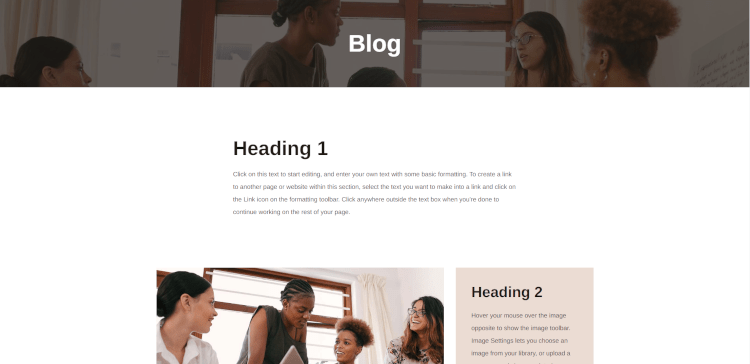
To begin with, your main focus should be on making sure your website has the information you need on the site and an easy way for clients to get in touch. However, as things progress you may want to consider creating additional content that speaks to not just your potential clients but is also useful for existing ones.
You may already be doing this through social media, but blog content is a great way to offer more evergreen content that is always available on your website.
To approach this take some time to figure out what questions your clients are asking, you’ll have a good idea already from the questions and problems you face during sessions. Building on these ideas, investigate what potential clients are asking online too. You can find inspiration in Facebook Groups, forums such as Reddit and Quora, or online tools like AnswerThePublic.
You can use your blog to answer these questions and demonstrate your knowledge and expertise; without giving too much value away. This gives you content that you can share on social media, and can lead into how you can offer more value through your services.
Your website brings all your marketing efforts together by becoming a hub that helps people start working with you. Whether you’re networking in your local community or communicating on social media, only by displaying your knowledge and expertise can you encourage people to work with you.
Wrapping Up
When building a website for your coaching website, these are the points you need to consider to find success online:
-
Keep an Objective Focus - Start by making sure your website is amazing at accomplishing its primary goal before building in more features.
-
Tell Your Story - People want to work with people, not businesses. Don’t be afraid to show your face and share why you’re passionate about what you do.
-
Let People Know What to Expect - Fear of the unknown could be preventing clients from reaching out. Help them understand exactly how you work so there are no surprises.
-
Display Results with Case Studies & Testimonials - Nothing is more powerful than examples of your work and what previous clients have to say about your service.
-
Make Taking Action Easy - Be thoughtful with your calls-to-action and where you can, add tools and functionality to make taking action less work.
-
Consider Starting a Blog - Your website is a hub for all your online activity, and content connects you to your audience. A blog can help you market your new website.
We’ve helped many coaches get up and running with their first websites over the years. So many in fact that we’ve got several dedicated templates to help guide your initial steps to website building and get started off of a professional framework. Check them out below or see our full range of website templates >>
Want Your Own Website?
Start Building Today!
No credit card needed. By submitting this form you agree to our T&Cs and Privacy Policy.
Coaching Website Templates
The website examples throughout this article were based on our demonstration website and template, Shine.
Want to get ahead and know how to successfully launch your website? You can make sure you never miss a trick by getting our email updates. We share the latest news from our blog along with tips and ideas you can utilise to grow your business online.


